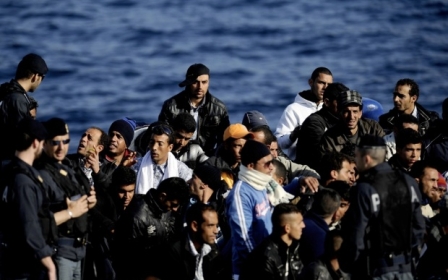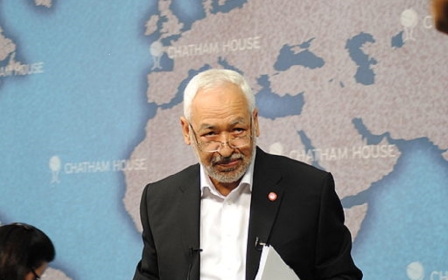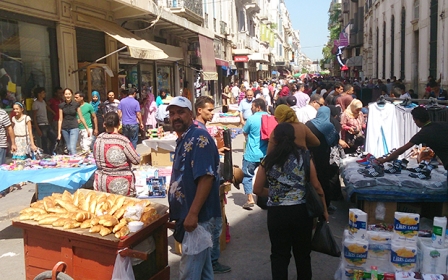Tunisian government criticised for 'arbitrary' restrictions on liberties

The Ibn Tin Association for Quran Sciences and Hadith describes itself as promoting the study of Islam and preaching the word of God across Tunisia. In July, however, the organisation received an unexpected call from the authorities. They were being shut down.
“So far we do not know the reason,” Ibn Tin leader, Abdallah Ben Said told Middle East Eye. A written notice stated that the decision was made “in order to preserve public security.”
Ibn Tin is one of 157 associations suspended by the government in a 22 July decision by Prime Minister Mehdi Jomaa for “security reasons.” The action has drawn criticism and raised questions about how the government can address the threat of violent groups that oppose the state, while still respecting the freedoms enshrined in Tunisian law and the country’s post-revolution constitution ratified earlier this year.
The decision by the prime minister's office followed a 16 July attack by militants in western Tunisia that killed 15 soldiers, the latest in a series of violent acts against the security forces that have taken place since early 2013.
In addition to suspending associations, the prime ministry targeted mosques that operate outside the control of the Ministry of Religious Affairs, mosques where the deaths of soldiers were celebrated, and media outlets that disseminate “inflammatory speech” or call for Jihad. A radio and television station were both suspended by the decision.
The prime minister’s office said in a statement that the measures were meant to ensure the success of Tunisia’s post-revolution democratic transition and create the conditions for this year’s upcoming elections to succeed. It also emphasised that it was a temporary “precautionary procedure,” and that the associations in question could challenge the decisions in court.
Ben Said is doing exactly that, hoping that a judge will allow Ibn Tin to resume its work. He says his organisation is not violent and does not reject the authority of the state.
“We don’t have the extremist ideology of Ansar al-Sharia,” he said, referring to a group banned by the Tunisian government last year and considered a terrorist organisation by the United States. “We demand the right to freedom of organisation.”
Human rights observers in Tunisia and abroad have criticised the government for violating legal procedures by issuing the suspensions.
Human Rights Watch issued a statement calling the decision “disproportionate and arbitrary.” Under a law drafted after the 2011 revolution, “only judges have the authority to order the suspension or dissolution of an association.” An association must initially receive a warning, followed by a 30-day suspension through a government application to a court. Only after this wait can a court order an association to be dissolved, according to the Human Rights Watch release.
The advocacy group stated that the suspensions also violate free association provisions in international treaties to which Tunisia is a party.
The Tunisian government should “lift these suspension notices immediately, and use the proper procedures established by law to go after any group that is truly involved in inciting violence,” Eric Goldstein, Human Rights deputy Middle East and North Africa director, said in the release.
The Tunis-based Observatory for Rights and Freedoms, an organisation that often provides legal assistance for religious groups and individuals, also condemned the decision as “arbitrary” in a 4 August statement. The judiciary alone can suspend an association after following procedures prescribed by law, and the government must avoid leading the country into “chaos and unlawfulness in the name of fighting terrorism,” it said.
The statement asserted that a decision to suspend an organisation without providing details of their alleged violations or following legal procedures was null and void, and could not prevent them from continuing their activities.
The prime ministry asserts the legality of the suspensions, however, stating that the decisions are legal under a 1975 statute.
The struggle between addressing the country’s security problems and respecting rights can also be seen in punishments given to television and radio stations.
The High Independent Authority for Audiovisual Communication (HAICA), established last year, has the authority to suspend programs it deems to have committed violations of broadcasting standards.
On 6 August, HAICA suspended “Ness Nessma News,” a nightly current affairs talk show on one of Tunisia’s most-watched television stations, for one month. The program’s panel included two Libyans, one identified as a political analyst and the other as director of a Libyan television station. HAICA accused Nessma of broadcasting the men’s calls for violence and not providing sufficient balance in its coverage.
“People belonging to extremist political movements came, and in their talk there were threats, calls for violence and the scarring of Tunisian society,” HAICA board member Hichem Snoussi told Middle East Eye. “The call also came in the context of what Libya is going through, which includes a civil war, without inviting other points of view to form a balance.”
“What we understood is that media platforms were turned into a propaganda space for violent political ideas and ideologies,” he added. The punishment for Nessma was particularly strong, Snoussi said, because the station did not appear before the board to defend itself.
Hannibal TV’s “Yahdoth fi Tunis” program was also suspended for one week for similar reasons, Snoussi said.
In February, HAICA had taken a similar step by forbidding the rebroadcast of a talk show episode featuring the father of a suspected assassin of a politician. The suspect had recently been killed in a confrontation with the police. The program was accused by the regulatory authority of “justifying terrorism.”
Snoussi does not see such restrictions as incompatible with a free press.
“We should distinguish between points of view that support societal security and support democracy building, and points of view that call for expression [of ideas] through the force of weapons and call for terrorism,” he said. “For us, these are not points of view but rather a societal sickness that should be fought.”
“CNN and BBC never dealt with Osama Bin Laden as a point of view,” he added. “That is why his speeches were never broadcast in a direct manner, but rather he was always transmitted through recorded tapes that were examined and scrutinised in order to be presented to the public opinion,” he said.
Mahmoud Dhaouadi of the Tunis Center for Press Freedom broadly agreed that press freedom needs some limitations.
“Journalistic work is like any other product,” he told Middle East Eye. “It is consumed and subject to ethical and professional regulations. Freedom of the press has responsibility.”
“Journalistic work is not sacred and infallible,” Dhaouadi added. “There is what we call media accountability, holding the journalist accountable for his product.”
New MEE newsletter: Jerusalem Dispatch
Sign up to get the latest insights and analysis on Israel-Palestine, alongside Turkey Unpacked and other MEE newsletters
Middle East Eye delivers independent and unrivalled coverage and analysis of the Middle East, North Africa and beyond. To learn more about republishing this content and the associated fees, please fill out this form. More about MEE can be found here.




